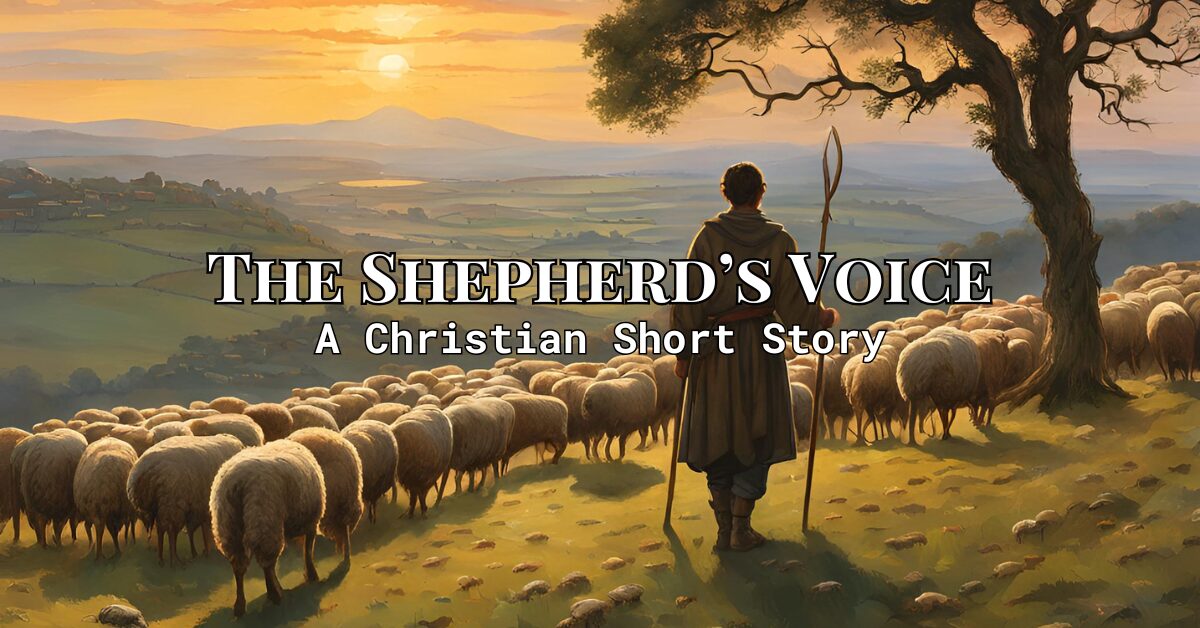In the tapestry of Jesus’ teachings, the Lost Sheep Parable stands out as a heartwarming illustration of God’s boundless grace and relentless pursuit of every individual. Told in Matthew 18:12-14, this parable delves into the depth of divine compassion, depicting a shepherd’s unwavering commitment to recover a single sheep that has strayed from the ninety-nine. Through this simple yet profound narrative, Jesus communicates a fundamental truth about the Kingdom of Heaven: no soul is too insignificant, no distance too great, and no effort too vast in the eyes of a loving God who seeks to reunite with His lost children.
The Lost Sheep Parable resonates with a universal longing for belonging and redemption, offering hope and assurance that we are never too far gone for God’s reach. It challenges prevailing notions of worth and priority, emphasizing that God’s love is not quantitatively dispensed but lavished abundantly upon every individual, regardless of their status or condition. This message of unconditional love and grace invites reflection on our own attitudes towards the lost, the least, and the left behind in our communities and encourages us to embody the shepherd’s heart in our interactions and endeavors.
As we explore the Lost Sheep Parable in this blog post, we will uncover the layers of meaning behind Jesus’ words, interpret their significance in the context of His broader teachings, and discuss practical ways to implement the principles of this parable in our daily lives. Join us as we journey through this compelling story, seeking to grasp the full measure of God’s love and to reflect that love in our world today.
Also Read: Parable of Jesus: The Householder
Parable of Jesus Christ: The Lost Sheep
The Lost Sheep Parable, Matthew chapter 18, verses 12-14 (WEB):
“What do you think? If a man has one hundred sheep, and one of them goes astray, doesn’t he leave the ninety-nine on the mountains, and go and seek the one that is going astray? If he finds it, most certainly I tell you, he rejoices over it more than over the ninety-nine which have not gone astray. Even so it is not the will of your Father who is in heaven that one of these little ones should perish.”
This passage, known as the Parable of the Lost Sheep, illustrates the compassion and care that God has for each individual, emphasizing the value of every soul and God’s desire to bring the lost back into safety.
Also Read: The 45 Parables of Jesus
Interpretation of The Lost Sheep

The Lost Sheep Parable, as presented in Matthew 18:12-14, is a profound narrative that reveals the heart of God towards those who have strayed from the path. Through the imagery of a shepherd who leaves his flock to find one lost sheep, Jesus unfolds the depth of divine compassion and individual worth in the Kingdom of Heaven. Let’s delve deeper into the multiple layers of meaning within this parable.
The Value of the Individual
Divine Compassion for the Lost: Central to the Lost Sheep Parable is the message that every individual holds immense value in the eyes of God. The shepherd’s decision to leave the ninety-nine in search of one lost sheep illustrates God’s willingness to go to great lengths to rescue a single soul. This act reflects a profound divine compassion that prioritizes the well-being of each person, challenging worldly notions of worth based on numbers or merit.
Unconditional Love: The shepherd’s action is a testament to unconditional love, highlighting that God’s love is not diminished by our failures or wanderings. The Lost Sheep Parable assures us that we are loved by God beyond our understanding, even when we feel most unworthy of such love.
The Nature of Repentance and Reconciliation
The Joy of Reunion: The joy expressed by the shepherd upon finding the lost sheep symbolizes the heavenly joy over one sinner who repents. This joy is not just a private matter but is shared among the heavens, emphasizing the communal aspect of salvation and the transformative power of repentance.
Initiative of God: The parable underscores that the initiative for reconciliation lies with God. The shepherd actively seeks the lost sheep, representing God’s initiative in seeking and saving those who are lost. The Lost Sheep Parable invites us to recognize and respond to God’s seeking love, reminding us that we are not left to find our way back alone.
Implications for the Community of Faith
Responsibility towards the Vulnerable: While the primary focus is on God’s action, the parable also speaks to the community of faith, urging believers to mirror the shepherd’s concern for the lost. It challenges us to extend grace, support, and understanding to those who are struggling or have strayed, emphasizing the role of the community in the process of restoration.
Celebrating Restoration: The communal celebration upon the sheep’s return is a model for the church’s response to repentance and reconciliation within its body. The Lost Sheep Parable encourages a culture of forgiveness, acceptance, and joy over the spiritual restoration of its members, fostering an environment where all feel valued and supported.
The Lost Sheep Parable is a powerful depiction of God’s relentless love and pursuit of each individual. It invites us to contemplate the depths of divine compassion, the joy of repentance and reconciliation, and the value of every soul in the eyes of God. Through this parable, Jesus not only reveals the heart of the Father but also sets forth an example for how we are to relate to one another within the community of faith, marked by love, understanding, and a readiness to seek and celebrate the return of the lost.
Also read: Parable of Jesus: The Net
Practical application of the Lost Sheep Parable in Our Daily Lives

How can you apply the Lost Sheep Parable in practically in your daily life? Let’s find out.
The Lost Sheep Parable, rich in its depiction of compassion and dedication, extends beyond the confines of a pastoral scene into the realm of our daily experiences. It serves as a guide for how we can embody the shepherd’s loving pursuit in our interactions and attitudes. Let’s explore how the principles from the Lost Sheep Parable can be woven into the fabric of our lives.
Embracing Compassion and Understanding
Seeking the Lost: Inspired by the shepherd’s dedication, we are called to look out for those in our communities who feel lost, marginalized, or forgotten. This could mean reaching out to a friend going through a tough time, offering support to someone who is struggling, or simply being present for those who feel alone. The Lost Sheep Parable teaches us the value of making an effort to understand and address the needs of those who have drifted away.
Offering Unconditional Love: Just as the shepherd shows unconditional love for the lost sheep, we are encouraged to offer love and acceptance to others, regardless of their circumstances or past decisions. Practicing non-judgmental support and demonstrating genuine care can be powerful catalysts for change and healing in someone’s life.
Fostering Joy and Celebration in Community
Celebrating Reconciliation: The joy of the shepherd upon finding the lost sheep is a model for our response to reconciliation within our communities. Whether it’s welcoming back someone who has been away from faith, celebrating personal milestones of recovery and growth, or acknowledging someone’s return to community life, we are invited to share in their joy and celebrate their presence among us.
Creating Inclusive Communities: The Lost Sheep Parable calls us to build communities where everyone feels valued and included. By actively creating spaces that welcome all—especially those who feel on the outskirts—we mirror the inclusive love shown by the shepherd. This means being intentional about our language, actions, and programs to ensure they reflect a heart of welcome and acceptance.
Living Out Persistent Faith
Demonstrating Persistence in Faith: The shepherd’s relentless search for the lost sheep encourages us to be persistent in our faith journey, especially in reaching out to others. Our efforts to guide, support, and love those around us, especially when they are not immediately fruitful, are valuable and meaningful. The parable reminds us that persistence in love and faith can lead to joyous outcomes.
Trusting in Divine Care: While we do our part in seeking and supporting the lost, the Lost Sheep Parable also reassures us of God’s overarching care and pursuit of each individual. It invites us to trust in God’s ability to work in the hearts of those we care for, knowing that ultimately, He is the shepherd who lovingly seeks and saves.
The Lost Sheep Parable is not just a story about God’s love but also a call to action for us to embody this love in tangible ways. By embracing compassion, fostering community, celebrating reconciliation, and living out our faith with persistence, we can apply the timeless lessons of this parable in our daily lives. Let the Lost Sheep Parable inspire us to reflect the heart of the shepherd in our actions and interactions, making a profound difference in the lives of those around us and demonstrating the depth of God’s love through our lives.
Conclusion

In conclusion, the Lost Sheep Parable stands as a powerful testament to the boundless love and compassion of God, a theme that resonates through the ages and speaks directly to the heart of every believer. This simple yet profound story illuminates the value of every individual in the eyes of the divine and calls us to mirror this divine compassion in our own lives. Through the narrative of a shepherd who leaves the ninety-nine to find the one, we are reminded of the importance of seeking out and supporting those who are lost, offering them the same unconditional love and acceptance that God offers us.
As we reflect on the practical applications of the Lost Sheep Parable, it becomes clear that its teachings are not meant to be admired from afar but lived out in our daily interactions and communities. By embodying the principles of compassion, inclusion, and persistent faith, we can extend God’s love to those around us, actively participating in the restoration and reconciliation of the lost. The parable challenges us to view every person as a cherished soul, worthy of effort and celebration upon their return to the fold.
Let the Lost Sheep Parable inspire us to be agents of God’s love in the world, actively seeking the welfare of those around us and rejoicing in every act of return and reconciliation. In doing so, we not only live out the teachings of Jesus but also contribute to a more compassionate, understanding, and inclusive community, reflective of the Kingdom of Heaven itself. The message of the Lost Sheep Parable is a clarion call to action, urging us to embrace our role as shepherds in our own right, guided by the example of the greatest Shepherd of all.
Read the Next: Parable of Jesus: The Good Shepherd








